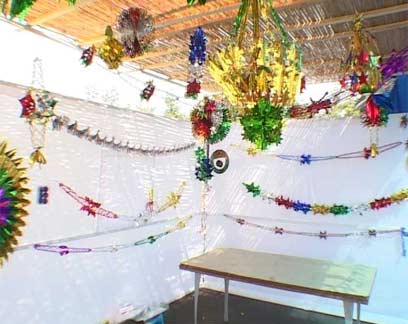_a.jpg)
Sukkot is the first of Judaism's Three Pilgrimage Festivals, the second being Passover and the third being Shavuot. Is is celebrated in autumn, on the 15th day of the month of Tishrei (late September to late October).
The bible goes into graphic detail of the holiday, its reasoning and customs: "So beginning with the fifteenth day of the seventh month, after you have gathered the crops of the land, celebrate the festival to the Lord for seven days; the first day is a day of rest, and the eighth day also is a day of rest.
"On the first day you are to take choice fruit from the trees, and palm fronds, leafy branches and poplars, and rejoice before the Lord your God for seven days. Celebrate this as a festival to the Lord for seven days each year.
"This is to be a lasting ordinance for the generations to come; celebrate it in the seventh month. Live in booths for seven days: All native-born Israelites are to live in booths so your descendants will know that I had the Israelites live in booths when I brought them out of Egypt. I am the Lord your God," (Leviticus 23:39-43).

Seven days and seven nights. A sukkah (Photo: Shai Rosenzweig)
The text also binds the holiday with the harvesting of summer produce, or "first fruits" – a connection first mentioned in the Book of Exodus: "Three times a year you are to celebrate a festival to me. Celebrate the Feast of Unleavened Bread… Celebrate the Feast of Harvest with the first fruits of the crops you sow in your field… Celebrate the Feast of Ingathering at the end of the year, when you gather in your crops from the field. Three times a year all the men are to appear before the Sovereign Lord," (Exodus, 23:14-17).
The holiday's main mitzvah calls for staying in booths – sukkot – for seven days, as means of marking the transience of human existence and man's dependence on God's blessing and bounties. According to Jewish law, only the men are obligated by the ordinance – which also calls for eating all meals in the sukkah and sleeping in it, but it is customary for the whole family to take part in it.
The second most important mitzvah calls for inviting the ushpizzin to the sukkah. According to custom, the ushpizzin are seven "spiritual guests" – leaders of the Israelites: Abraham, Isaac, Jacob, Joseph, Moses, Aaron and David.
The holiday's third mitzvah calls for blessing over the Four Species: Lulav, a green, closed frond from a palm tree; Hadass, a leaved branch from the myrtle tree; Aravah, a branch from the willow tree; and Etrog, a fruit of a citron tree.
The seventh day of Sukkot, is called Hoshana Rabbah. The day is usually marked by a special synagogue service, in which seven circles are made by the worshippers with the lulav and etrog, while the congregation recites prayers.
Those celebrating the holiday are also ordered to rejoice: "Celebrate the Feast of Tabernacles for seven days after you have gathered the produce of your threshing floor and your winepress.
"Be joyful at your Feast – you, your sons and daughters, your menservants and maidservants, and the Levites, the aliens, the fatherless and the widows who live in your towns. For seven days celebrate the Feast to the Lord your God… For the Lord your God will bless you in all your harvest and in all the work of your hands, and your joy will be complete," (Deuteronomy 16:13-15)














